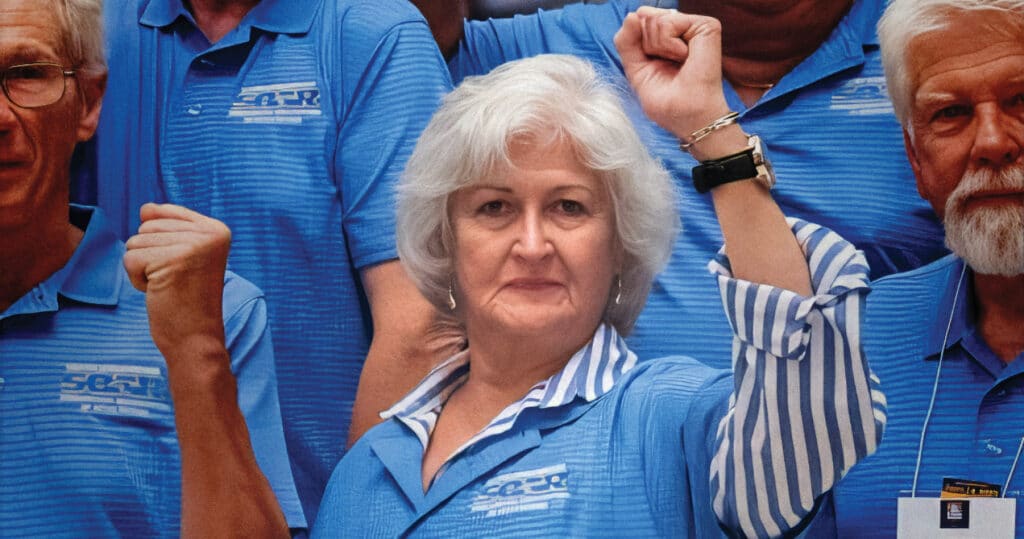Lifting Education Higher: USW’s College Professors Fight for Better Universities for Faculty, Students

When Rich Schiavoni tells people that he is a member of the United Steelworkers union, they often will ask him what he makes.
“I make college students,” is the answer he has at the ready, knowing that isn’t necessarily the response people expect.
“I’m constantly blown away by the diversity of what USW members do and what they make,” said Schiavoni, a part-time history and political science professor at Point Park University in Pittsburgh who grew up around family members who worked in Western Pennsylvania’s steel industry.
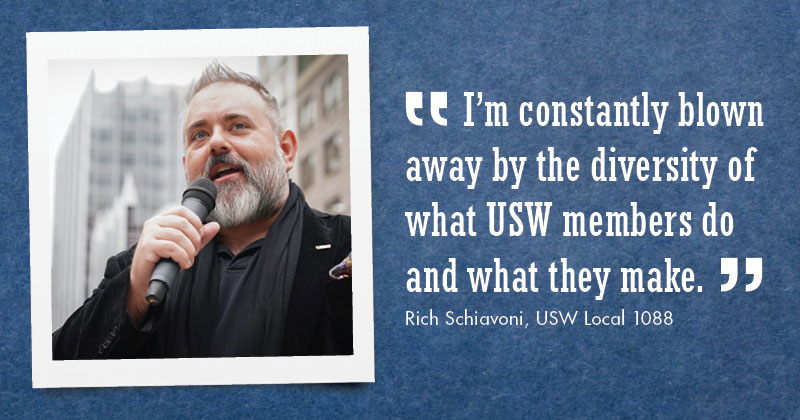
“They worked in the mills, they worked on the railroad, they were all in a union,” he said. “I’m proud that I get to carry on that tradition in a different way.”
Growing Contingent
As members of Local 1088, Schiavoni and his fellow part-time professors at Point Park and nearby Robert Morris University are among a growing number of higher education professionals who are part of the USW. In October 2021, about 3,400 faculty members at the University of Pittsburgh (known as Pitt) voted overwhelmingly to join the union.
In addition, Local 1998 has represented about 7,000 staff members at the University of Toronto for the past 25 years, and Local 4120 represents 885 administrative and technical staff at the University of Guelph, also in Ontario.
The latest influx of thousands of higher education workers into the USW makes perfect sense to International President Tom Conway.
“The USW is a union for all workers who want a strong voice in their workplace and who want a large, diverse and dedicated group of people across North America who are committed to that same fight,” Conway said. “Ultimately, academic workers have a lot in common with everyone else who works for a living – they want a seat at the table for the decisions that affect their work, they want to build a better life for themselves and their families, and they want to be able to retire with dignity.”
Seeking Fairness
That fight for fairness and dignity was what led Melinda Ciccocioppo to get involved in the effort to organize the University of Pittsburgh faculty. Ciccocioppo, a full-time professor in the Pitt psychology department, has worked at the university in some capacity since 2006, and earned her PhD at the school.
While members are still in the process of bargaining their first contract, Ciccocioppo is confident that the USW will make a difference in at least two areas that make life challenging for higher education professionals – low pay and precarious, unpredictable work.
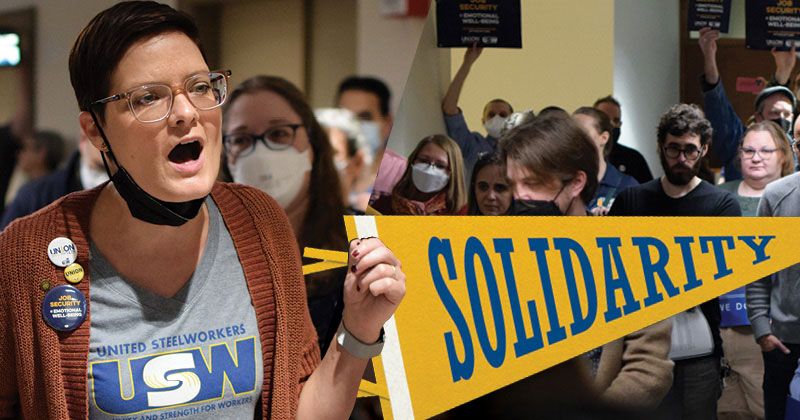
Part-time faculty members, she said, sometimes find out just a few weeks before a semester begins whether or not they’ll have a job, and often get paid so little that most of them are forced to seek second and third jobs to make ends meet.
“For full-time faculty, contracts can be as short as one year, and it could be renewed, but you don’t know for sure. There is no expectation of continued employment after that,” she said. “In reality, we might have better job security working at Target.”
That kind of treatment is unnecessary, particularly for a major university like Pitt, with an enrollment of 35,000 students, an endowment of more than $5 billion and an annual budget of more than $2.4 billion.
“They know pretty well from one semester to the next how many students they’ll have, how much work there will be,” she said. “There really isn’t any reason for them to have us remain precarious.”
Major Pay Gap
Besides the constant uncertainty of their employment, non-tenure-track professors, particularly those who work part time, are paid significantly less than their tenure-track peers.
“The reality is that two-thirds of our faculty are non-tenure-stream faculty, which means we are on short-term contracts, typically one semester long,” Ciccocioppo said. “It seems absurd that if you’re doing a good job and there’s still work for you to do, that you should have to reapply for your job every year.”
A strong contract would mean guaranteed contract renewals for instructors who are doing good work, and living wages so that professors don’t have to toil day and night to make ends meet. The USW proposed automatic renewals this summer and is moving forward on other bargaining goals, but progress at the table has been slow.
“The university is able to make a huge profit by having a contingent work force that they can pay very little and continue to raise tuition every year,” Ciccocioppo said. “These are exactly the kinds of things a union can help us with.”
Progress at Pitt
As the Pitt faculty unit makes progress toward a first agreement, the staff workers at the university’s five campuses are pushing forward with an organizing campaign of their own. That group of about 7,000 workers includes advisors, researchers, scientists, library and technology specialists, accountants, designers, counselors, and administrative assistants.
To Marcelle Pierson, a professor of music theory at Pitt, the presence of the USW, even before a first contract is ratified, has already made a positive difference for the entire university community.
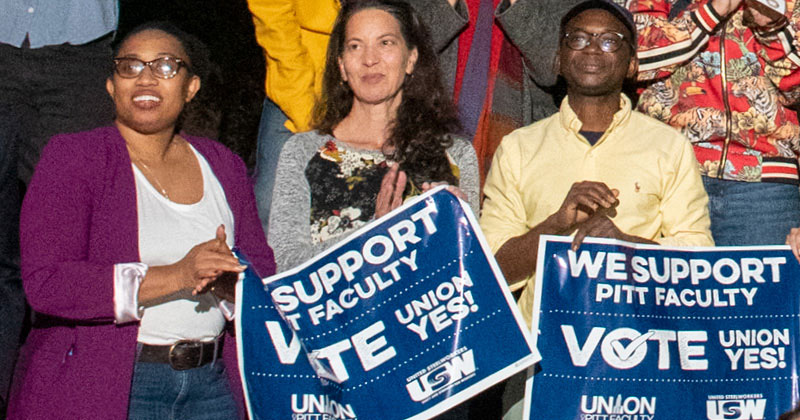
The faculty union managed to reach several interim agreements with the university administration, including one governing COVID-19 protocols that helped to protect faculty members with serious health conditions.
“We were able to establish some common-sense guidelines,” Pierson said. “We were able to solve that problem in a practical way, and we were only able to do that because we had this leverage.”
The workers at Pitt also reached an interim agreement with the school on pay raises for part-time faculty, who previously had been excluded from such arrangements.
“They really are the backbone of teaching,” Pierson said of part-time instructors.
When part-time professors from Point Park and Robert Morris joined the USW in 2016, their goals were much the same as those the Pitt faculty is fighting for now – more job stability and living wages for adjunct professors. Over the term of their first three-year contract, the professors saw an overall pay raise of more than 21 percent.
In December, Local 1088 reached a new contract agreement with Point Park that includes 12 percent in pay increases as well as paid sick days and job security protections that will guarantee course appointments.
The agreement is the third for the local, and it brings the total wage increase over the terms of those contracts to 43 percentage points.
“Our members make up more than two-thirds of the teaching work force,” Schiavoni said. “The new agreement is a solid win for part-time faculty.”
Quality Education
Besides making life better for the workers at the front of the class, the presence of a union at institutions of higher education also helps to bolster the quality of education and the feeling of community on a campus, members say.
Pierson said the union brings together academic workers from across the university’s many departments who might otherwise never interact.
“One of the problems in higher education is that people often are operating in silos,” Pierson said. “With the union, it gives me so much more context to do my job and to act in ways that are beneficial both to myself and my colleagues.”
Regional Organization
The fact that the USW represents professors at three of the largest colleges in Western Pennsylvania helps to ensure fair treatment for all higher education workers in the region, union or not, Ciccocioppo said.
“All of these universities are sharing the same pool,” she said. “To have us be organized across institutions gives us more power. It provides us with an opportunity to set a floor that is more powerful.”
That power, along with the continuity and job satisfaction that comes with higher pay and more secure employment, also means better outcomes for students, she said.
A lack of job security means less time for instructors to develop their curriculum, and can mean delays in ordering books and other classroom supplies.
“It’s important to remember that our working conditions are student learning conditions, so when our jobs are precarious, it means students can’t count on us to be there in the future,” Ciccocioppo said. “Having that ownership of our classes is important as well, for the students as much as it is for the faculty.”
During a demonstration in December outside the Pitt provost’s office, Ciccocioppo joined about 75 of her colleagues to express their frustration at the slow pace of bargaining.
“It is our work that makes this university,” she said.
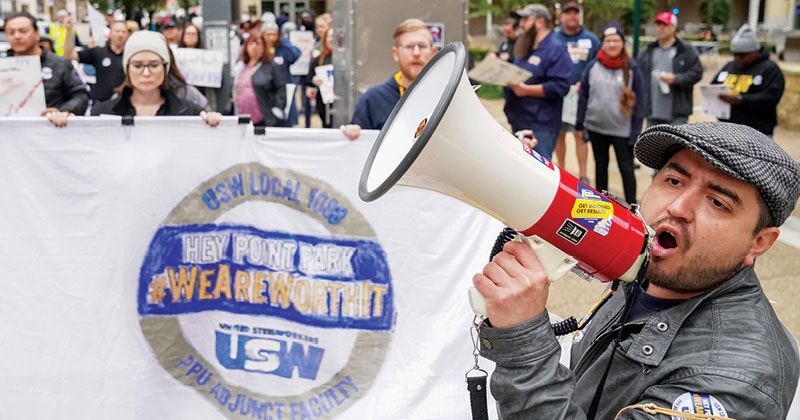
By clicking Sign Up you're confirming that you agree with our Terms and Conditions.
Recent News Articles
Want to Learn More?
See how the USW is making a real difference in our communities and our workplaces.

